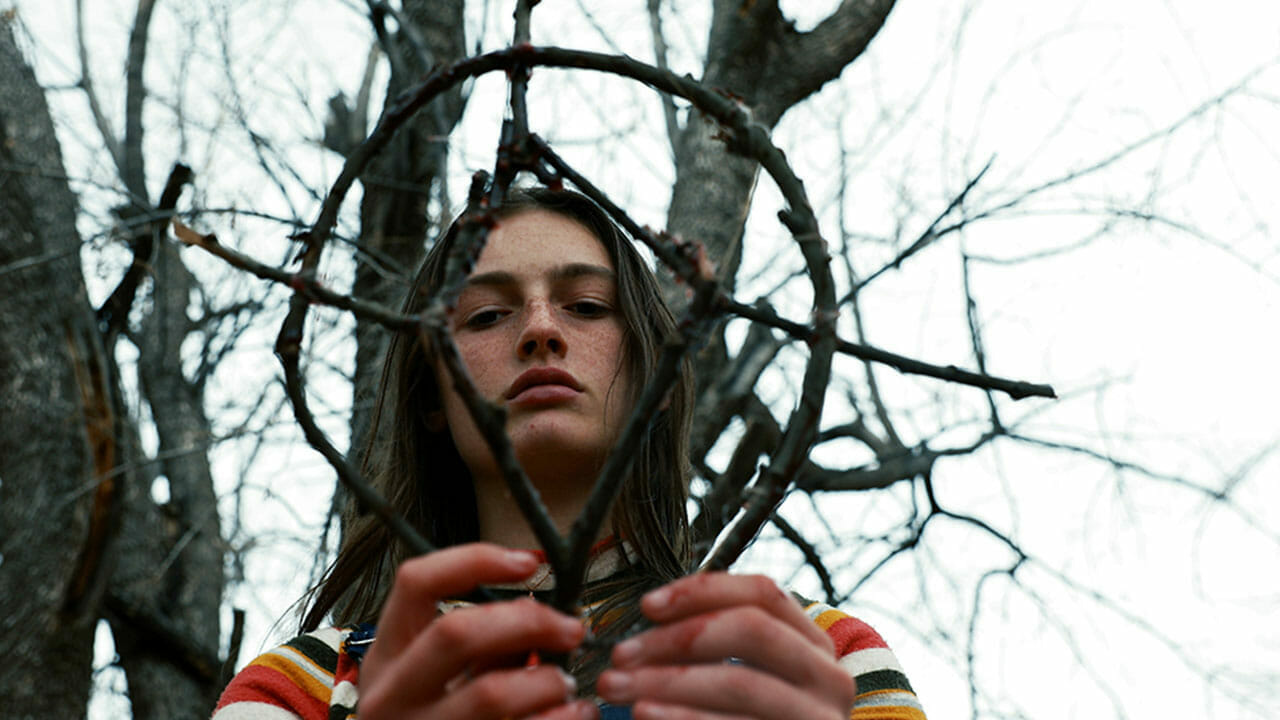What to Watch Verdict
'Hellbender' is a punk-rock tale of adolescence with an occult witchcraft bend that's best in its quietest threats, as generational pangs are both satanically sweet and bloody dangerous.
Pros
- +
🪱 Well acted parent-child explorations.
- +
🪱 Nifty soundtrack.
- +
🪱 Comes of age with a uniquely destructive bend.
Cons
- -
🪱 Feels its restraints.
- -
🪱 Effects can't always stack up.
- -
🪱 Third act hits the eject button.
Hellbender is part of our Fantasia Fest 2021 coverage.
The Adams family’s latest collaboration Hellbender is a scrappy and spunky satanic coming-of-age tale that’s as homegrown as the definition will allow. Last year’s The Deeper You Dig swept Fantasia Film Festival audiences away in the communal filmmaking styles of a mother, father, and daughter—I wasn’t one such fan, which I stress because they’ve refined their techniques a bit further in 2021. Hellbender is as punk-rock as it is cursed and spellbinding, albeit still a bit constricting because of ambitions that cannot be budgetarily or practically accomplished. Inspirational filmmaking unions aside, critics judge the product studios or self-funded mavericks present in theaters—Hellbender is my tempo of rock 'n roll relationship drama.
Zelda Adams, Toby Poser, and John Adams share writing and directorial credits, centering their narrative on youngster Izzy’s (Zelda Adams) dynamic with her withholding mother (Toby Poser). They live a reclusive mountaintop lifestyle where trespassers are poofed into dust, and Izzy believes she’s compromised by an isolating auto-immune disease. That turns out to be hogwash when mama reveals their bloodline has been tainted long ago. Izzy’s blossoming into her own womanhood, which means socialization desires are becoming stronger—a mother knows saying “no” only furthers their child’s rebellion, so it’s time for Izzy to learn the truth.
The idea of “Hellbenders” becomes a compassionate and dangerous metaphor for motherhood and adulthood. The Adams clan thumbs through texts that craft able backstory flourishes about generational abilities and the fantastical elements they create—keyholes appear on hands when the correct symbol is palmed, for example. Witcraft becomes a shared bonding experience between Izzy and her mother until the rambunctious immaturity of a teenager under house arrest becomes intertwined with mounting supernatural strengths. An emphasis on forage culture, maggots as hallucinogens, and teased cannibalism become everything that raises rule-abiding tensions any hormonally raging adolescent has ever experienced—Zelda and Toby navigate their characters' duels, their shared growth, and their housebound showdowns so well.
In mentioning the film’s successful dark arts effects, we must also address how Hellbender grasps onto the trio’s adoration of terror-hopeful montages. When Izzy’s mother places her hand upon a sacred text, we’re throttled into a trippy-aggressive parade of flashes that is overwhelmingly filled with freaky-for-freaky’s-sake extremism. Cackling demon faces. Trees distorted through swirly filters. Jolts from black-and-white to kaleidoscope color wheels. Chewed human flesh. It’s like a Halloween prop store’s goodies are stuffed into a cannon and blasted onto the screen, but it’s always this jarring rip away from the more solemn, cumbersome beats that weigh upon two united souls vying for rebirth on their own unique paths.
That becomes the juxtaposition of quality in an otherwise punk-rock coven anthem (H6llb6nd6r is the mother-daughter band in the film, and—you guessed it—Team Adams perform all original tracks). “If you break my heart, I’ll devour you.” Such a poetic threat showcases the highs of Hellbender at their quietest, as Toby emphasizes her sage wisdom’s dreadful dominance atop acoustic guitar background plucks. H6llb6nd6r lyrics about embracing the apocalypse and soaking in doom-alt-metal chaos present unique genre evolutions as the story unfolds. Asides where an onslaught of abrasive, in-your-face violation imagery exposes what Izzy’s mother cannot control but detracts from the disquieting nature of the hushed ballad between equal allies and adversaries. The Adams family comes into their own as storytellers in Hellbender—however, special effects still selectively struggle to impress beyond the key performances with dialogue and blood capsules.
There are constants throughout Hellbender that engage my personal tastes when it comes to musical reflection as a method of character development. No hyperbole, H6llb6nd6r lays down tracks that I’d applaud while slugging overpriced PBRs in a sweaty basement show. Are there some Snapchat filter lookin’ overlay shots when Izzy or her mother flash their monstrous "Hellbender" proper forms—sometimes while rocketing into the sky as a display of inhumanity? Indeed, but those are shorter bursts between thoughtful anarchism and emotional divergences amidst woodland magic lessons. There are third-act problems, and its indie nature can’t escape some lacking production notes, but Hellbender is the leap I hoped to see from an Adams collective making horror movies on their outcast terms.
The latest updates, reviews and unmissable series to watch and more!
Matt Donato is a Rotten Tomatoes approved film critic who stays up too late typing words for What To Watch, IGN, Paste, Bloody Disgusting, Fangoria and countless other publications. He is a member of Critics Choice and co-hosts a weekly livestream with Perri Nemiroff called the Merri Hour. You probably shouldn't feed him after midnight, just to be safe.


